Mercedes EQS SUV vs MINI Aceman – Differences & prices compared
Two cars, one duel: Mercedes EQS SUV meets MINI Aceman.
Which one wins in performance, efficiency and value for money? Find out now!
Costs and Efficiency:
Price and efficiency are key factors when choosing a car – and this is often where the real differences emerge.
MINI Aceman has a decisively advantage in terms of price – it starts at 25500 £, while the Mercedes EQS SUV costs 95000 £. That’s a price difference of around 69515 £.
In terms of energy consumption, the advantage goes to the MINI Aceman: with 14 kWh per 100 km, it’s significantly more efficient than the Mercedes EQS SUV with 19.60 kWh. That’s a difference of about 5.60 kWh.
As for range, the Mercedes EQS SUV performs clearly better – achieving up to 695 km, about 290 km more than the MINI Aceman.
Engine and Performance:
Power, torque and acceleration are the classic benchmarks for car enthusiasts – and here, some clear differences start to show.
When it comes to engine power, the Mercedes EQS SUV has a decisively edge – offering 658 HP compared to 258 HP. That’s roughly 400 HP more horsepower.
In acceleration from 0 to 100 km/h, the Mercedes EQS SUV is convincingly quicker – completing the sprint in 4.40 s, while the MINI Aceman takes 6.40 s. That’s about 2 s faster.
In terms of top speed, the Mercedes EQS SUV performs hardly perceptible better – reaching 210 km/h, while the MINI Aceman tops out at 200 km/h. The difference is around 10 km/h.
There’s also a difference in torque: Mercedes EQS SUV pulls decisively stronger with 950 Nm compared to 350 Nm. That’s about 600 Nm difference.
Space and Everyday Use:
Cabin size, boot volume and payload all play a role in everyday practicality. Here, comfort and flexibility make the difference.
Both vehicles offer seating for 5 people.
In curb weight, MINI Aceman is decisively lighter – 1720 kg compared to 2695 kg. The difference is around 975 kg.
In terms of boot space, the Mercedes EQS SUV offers clearly more room – 645 L compared to 300 L. That’s a difference of about 345 L.
In maximum load capacity, the Mercedes EQS SUV performs significantly better – up to 2100 L, which is about 1095 L more than the MINI Aceman.
When it comes to payload, Mercedes EQS SUV barely noticeable takes the win – 570 kg compared to 530 kg. That’s a difference of about 40 kg.
Who comes out on top?
Overall, the Mercedes EQS SUV shows itself to be leaves the rival little chance and secures the title of DriveDuel Champion.
It convinces with the more balanced overall package and proves to be the more versatile choice for everyday use.
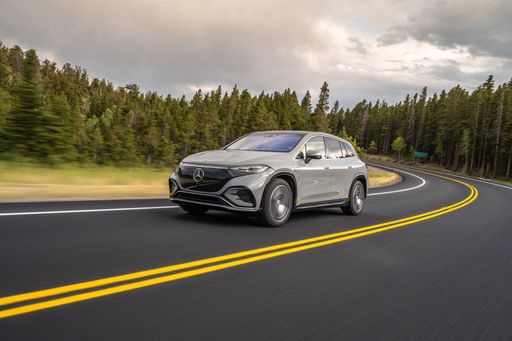 @ Mercedes-Benz Group Media
@ Mercedes-Benz Group Media
Mercedes EQS SUV
Mercedes EQS SUV
The Mercedes-Benz EQS SUV redefines luxury in the electric vehicle segment with its elegant design and cutting-edge technology. Its spacious interior provides exceptional comfort, featuring high-quality materials and innovative ambient lighting to create a serene driving environment. This SUV impressively combines sustainability with performance, offering a smooth and quiet ride without compromising on power.
details @ Mercedes-Benz Group Media
@ Mercedes-Benz Group Media
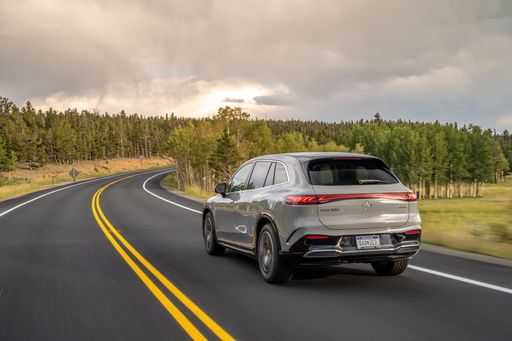 @ Mercedes-Benz Group Media
@ Mercedes-Benz Group Media
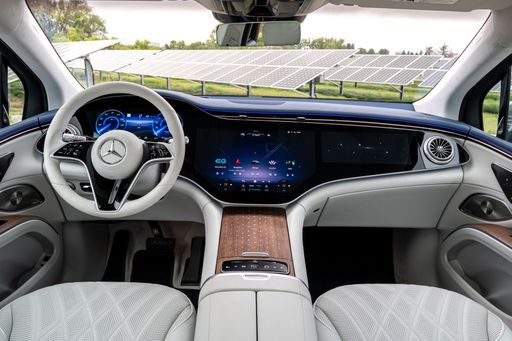 @ Mercedes-Benz Group Media
@ Mercedes-Benz Group Media
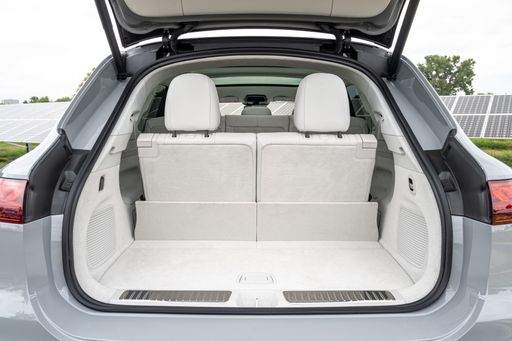 @ Mercedes-Benz Group Media
@ Mercedes-Benz Group Media
MINI Aceman
The MINI Aceman offers a fresh take on urban mobility, blending iconic design elements with modern technology. Its compact form is paired with an interior that exudes both comfort and style, making it a popular choice for city drivers. With an emphasis on sustainability, the Aceman features eco-friendly materials and innovative features that enhance the driving experience.
details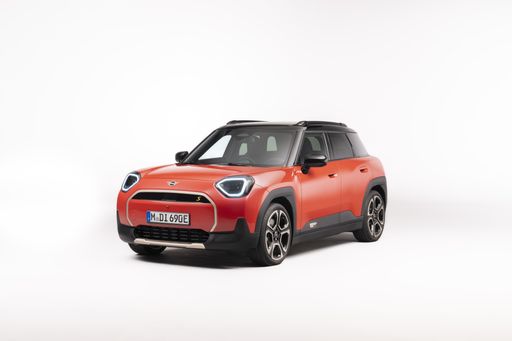 @ MINI / BMW Group Press
@ MINI / BMW Group Press
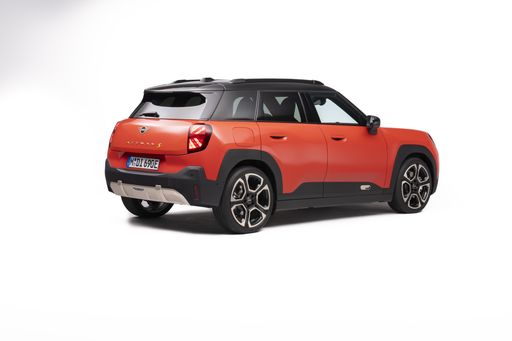 @ MINI / BMW Group Press
@ MINI / BMW Group Press
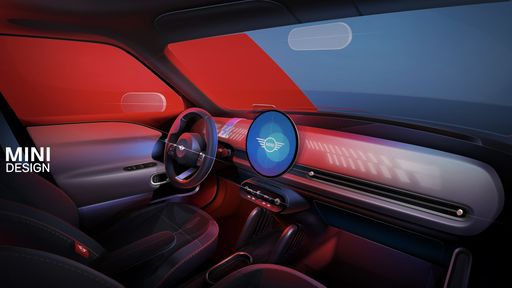 @ MINI / BMW Group Press
@ MINI / BMW Group Press
 @ Mercedes-Benz Group Media
@ Mercedes-Benz Group Media
|
 @ MINI / BMW Group Press
@ MINI / BMW Group Press
|
|
|
|
Costs and Consumption |
|
|---|---|
|
Price
95000 - 212100 £
|
Price
25500 - 36200 £
|
|
Consumption L/100km
-
|
Consumption L/100km
-
|
|
Consumption kWh/100km
19.6 - 21.9 kWh
|
Consumption kWh/100km
14 - 16 kWh
|
|
Electric Range
615 - 695 km
|
Electric Range
303 - 405 km
|
|
Battery Capacity
108.4 - 118 kWh
|
Battery Capacity
38.5 - 49.2 kWh
|
|
co2
0 g/km
|
co2
0 g/km
|
|
Fuel tank capacity
-
|
Fuel tank capacity
-
|
Dimensions and Body |
|
|---|---|
|
Body Type
SUV
|
Body Type
SUV
|
|
Seats
4 - 5
|
Seats
5
|
|
Doors
5
|
Doors
5
|
|
Curb weight
2695 - 3075 kg
|
Curb weight
1720 - 1825 kg
|
|
Trunk capacity
440 - 645 L
|
Trunk capacity
300 L
|
|
Length
5125 mm
|
Length
4079 mm
|
|
Width
1959 - 2034 mm
|
Width
1754 mm
|
|
Height
1718 - 1721 mm
|
Height
1514 mm
|
|
Max trunk capacity
2100 L
|
Max trunk capacity
1005 L
|
|
Payload
425 - 570 kg
|
Payload
450 - 530 kg
|
Engine and Performance |
|
|---|---|
|
Engine Type
Electric
|
Engine Type
Electric
|
|
Transmission
Automatic
|
Transmission
Automatic
|
|
Transmission Detail
Reduction Gearbox
|
Transmission Detail
Reduction Gearbox
|
|
Drive Type
All-Wheel Drive, Rear-Wheel Drive
|
Drive Type
Front-Wheel Drive
|
|
Power HP
360 - 658 HP
|
Power HP
184 - 258 HP
|
|
Acceleration 0-100km/h
4.4 - 6.8 s
|
Acceleration 0-100km/h
6.4 - 7.9 s
|
|
Max Speed
210 km/h
|
Max Speed
160 - 200 km/h
|
|
Torque
568 - 950 Nm
|
Torque
290 - 350 Nm
|
|
Number of Cylinders
-
|
Number of Cylinders
-
|
|
Power kW
265 - 484 kW
|
Power kW
135 - 190 kW
|
|
Engine capacity
-
|
Engine capacity
-
|
General |
|
|---|---|
|
Model Year
2024
|
Model Year
2024 - 2025
|
|
CO2 Efficiency Class
A
|
CO2 Efficiency Class
A
|
|
Brand
Mercedes-Benz
|
Brand
MINI
|
Is the Mercedes EQS SUV offered with different drivetrains?
The Mercedes EQS SUV is available as All-Wheel Drive or Rear-Wheel Drive.
The prices and data displayed are estimates based on German list prices and may vary by country. This information is not legally binding.
